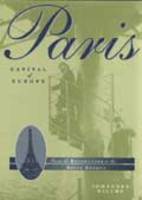
- 2002/436 pages
- Distributed for Holmes & Meier Publishers
Paris, Capital of Europe:
From the Revolution to the Belle Epoque
Paperback: $19.95
ISBN: 978-08419-1246-5
A History Book Club Alternate Selection
Few understand or appreciate the evolutionary process that transformed Paris from the capital of France into the capital of Europe. Paris: From the Revolution to the Belle Epoque is the lively, provocative, meticulously researched story of that remarkable transformation.
Johannes Willms, a historian and journalist, covers the years from the brink of upheaval on the eve of the Revolution to the First World War and masterfully weaves various social, political, artistic and economic threads into a vivid tapestry, allowing the general reader, as well as the scholar, the rare opportunity to grasp the city in Proustian detail.
Few understand or appreciate the evolutionary process that transformed Paris from the capital of France into the capital of Europe. Paris: From the Revolution to the Belle Epoque is the lively, provocative, meticulously researched story of that remarkable transformation.
Johannes Willms, a historian and journalist, covers the years from the brink of upheaval on the eve of the Revolution to the First World War and masterfully weaves various social, political, artistic and economic threads into a vivid tapestry, allowing the general reader, as well as the scholar, the rare opportunity to grasp the city in Proustian detail.
One reads not only of the Terror and the commune, for instance, but also of street life and repression, social customs, Napoleonic architecture, the growth of trade and commerce, work and wages, health and hygiene, morality, class struggles, crime, and of course art and entertainment. Willms culls his information from a wide range of sources: scholarly histories in several languages, municipal archives, novels, and even guidebooks.
This careful and eclectic approach makes Paris a fascinating authoritative social history of the city whose reign as the capital of Europe may have ended long ago, but which, true to its motto—fluctuat, nec mergitur (it is tossed by the waves but does not sink)— remains redoubtable.






